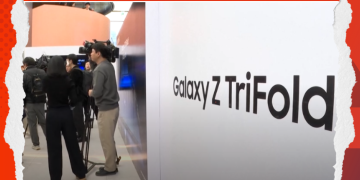NVIDIA Corporation shattered records, becoming the first public company to reach a $4 trillion market capitalization. The chipmaker’s shares climbed 2.7% to $164.32 in intraday trading, cementing its position as the world’s most valuable company.
This milestone arrives just two years after NVIDIA first crossed the $1 trillion threshold in June 2023. The company’s value has more than quadrupled during this period, driven by explosive demand for artificial intelligence chips that power everything from ChatGPT to autonomous vehicles.
NVIDIA Commands 90% of AI Chip Market
The Santa Clara-based company dominates the artificial intelligence semiconductor landscape with an estimated 90% market share in data center GPUs. This stranglehold stems from two key advantages: superior hardware performance and the deeply entrenched CUDA software ecosystem.
NVIDIA’s H100 and A100 GPU series have become the gold standard for AI training and inference workloads. Tech giants like Microsoft, Google, Meta, and Amazon have collectively purchased over 1.3 million Hopper GPUs to power their cloud services and AI applications.
The company’s CUDA programming platform creates powerful network effects that lock in customers. Developers spend years optimizing their code for NVIDIA’s architecture, making it extremely costly to switch to competing platforms from AMD or Intel.
Jensen Huang’s Wealth Surpasses Warren Buffett
NVIDIA’s soaring stock price has propelled CEO Jensen Huang’s net worth to $143.6 billion, surpassing Warren Buffett’s $142.4 billion fortune. Huang, who co-founded the company in 1993, owns approximately 3.5% of NVIDIA’s shares.
The 61-year-old executive has gained $27.6 billion in wealth since January 2025 alone. His rise to become the world’s eighth-richest person reflects NVIDIA’s transformation from a gaming graphics company to the backbone of the AI revolution.
Huang’s leadership has positioned NVIDIA to capture multiple technology trends simultaneously. The company now serves gaming, data centers, automotive, robotics, and professional visualization markets with specialized chip designs.
Blackwell Chips Sold Out Until 2026
NVIDIA’s latest Blackwell GPU architecture has generated unprecedented demand from cloud service providers and enterprise customers. The company reports that Blackwell chips are completely sold out through the end of 2025, with waiting lists extending into 2026.
The new architecture delivers significant performance improvements over the previous Hopper generation. Blackwell GPUs offer enhanced AI training capabilities and improved energy efficiency, making them essential for next-generation AI applications.
Major cloud providers have placed massive orders for Blackwell-based systems. Oracle and OpenAI plan to deploy 64,000 GB200 microchips in their upcoming Stargate data center project, representing billions in revenue for NVIDIA.
Data Center Electricity Demand Surges
The AI boom is creating massive electricity consumption requirements across global data centers. Industry experts project that data center electricity usage will more than double to 945 terawatt-hours by 2030, equivalent to Japan’s entire power consumption.
AI-optimized data centers consume significantly more energy than traditional facilities. Training large language models requires continuous operation for weeks or months, while inference workloads create ongoing power demands as millions of users interact with AI applications.
This energy surge presents both challenges and opportunities. Power grid operators must expand capacity, while energy companies see increased demand for natural gas, nuclear power, and renewable energy sources.
Revenue Growth Continues at Record Pace
NVIDIA’s financial performance matches its stock price appreciation. The company reported $30.0 billion in quarterly revenue, representing 122% year-over-year growth. Data center revenue reached $26.3 billion, up 154% from the previous year.
Analysts project NVIDIA will achieve $200 billion in annual revenue for fiscal 2026, with potential to reach $250 billion in fiscal 2027. This growth trajectory would make NVIDIA one of the largest technology companies by revenue.
The company’s gross margins remain exceptionally high due to limited competition in high-performance AI chips. NVIDIA can charge premium prices for its most advanced processors, translating strong demand into substantial profits.
Global AI Investment Reaches Trillion-Dollar Scale
CEO Jensen Huang predicts that global data center capital expenditure will triple from $330 billion in 2025 to $1 trillion within three years. This massive investment reflects the scale of AI infrastructure buildout across industries.
Cloud service providers are constructing AI-optimized data centers specifically designed for training and running large language models. These facilities require specialized cooling systems, power distribution, and networking infrastructure to support NVIDIA’s high-performance chips.
The trillion-dollar projection includes spending on servers, networking equipment, storage systems, and the facilities to house them. NVIDIA stands to capture a significant portion of this investment through its comprehensive AI platform offerings.
Stock Analysts Raise Price Targets
Wall Street analysts have raised their price targets for NVIDIA stock following the $4 trillion milestone. Several investment firms now project the stock could reach $180 to $200 per share within the next 12 months.
The bullish outlook reflects confidence in NVIDIA’s ability to maintain its AI chip leadership position. Analysts cite the company’s technological moats, expanding addressable market, and lack of viable short-term competition.
However, some investors warn about potential risks including increased competition, regulatory challenges, and possible AI market saturation. The company’s enormous valuation leaves little room for execution missteps or market disappointments.
NVIDIA’s historic achievement demonstrates the profound impact of artificial intelligence on global technology markets. As the first company to reach $4 trillion in market value, NVIDIA has established itself as the primary beneficiary of the AI revolution that continues reshaping industries worldwide.















Comments 2